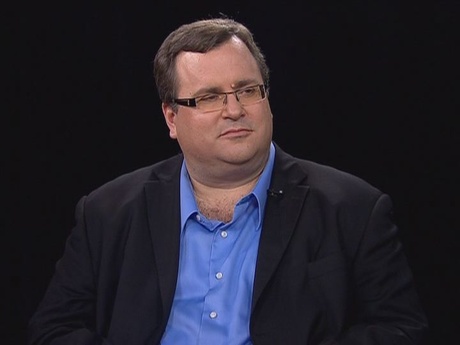« June 10, 2012 - June 16, 2012 | Main | June 24, 2012 - June 30, 2012 »
June 23, 2012
Using the complaint against your client: Confer right away--like now--with your shop's dorky non-litigators on the 33rd Floor.
Litigation puts a spotlight on things you can fix. Things you can fix now. The opportunities are endless--for both GCs and outside counsel--and you see them in every dispute filed.
Take a look at the last three or four complaints filed against any of your clients. Or, even better, review again that one you just received today. If you are outside counsel, or even inside counsel, and "do" litigation, you are presented with all manner of improvements and changes a good client can and should make to its operations right away.
Yes, fix it. Like now. A client problem--it will usually fall in the category of "imperfections" or "operational glitches" rather than wrongdoing or illegality--is sitting there in the complaint right now looking at you.

Now, before the next order is received, before the next shipment is made, before the next employee termination, before you execute the next license agreement, before the next disposal of that residual waste from day-to-day operations, get that problem to someone who can fix it, not litigate it.
But how many of us--outside counsel, and even GCs in litigation management and oversight--don't say or do anything, or simply put it off, because we think it's not part of our "litigation" job?
Or we think it's a problem we'll mention to the polite transactional and tax lawyers down the hall--the ones the client has used to plan and grow for decades--when and if we get around to it? But we never do take action on it. It becomes a well-meaning "things-to-do" note made in the excitement of the beginning of a fight.
Litigation often hands you the chance to add long-term value immediately--and solve an operations problem before you finish the barest outline of the Answer or Rule 12 Motion.
Examples: Lame or muddy contract language inherited from a predecessor. Confusing or poorly drafted choice of law or ADR provisions, which always seem to get litigated preliminarily in an expensive opening sideshow that delays focus on the merits. Or waste storage or handling methods which "comply"--but just barely--and makes a state or federal agency or private citizen look a little too hard and long at your client's facility next Spring.
My favorite after terms and conditions in contract language is always this: Bad HR practices, or the repeated "un-classy" firing--a termination which is legal but brutal and inartful and will get you sued. You win handily--but fees to obtain summary judgment exceed $100,000.
How handy is that? At what price glory?
Long-term, you're not hired--as outside counsel or a GC--to have a good defense, or a "good case". You are hired to have: (1) no future issue, (2) no investigation (3), no dispute and/or (4) no lawsuit.
The opportunities are endless--for both GCs and outside counsel--and you see them in every dispute filed.
(from several past posts)
Posted by JD Hull at 01:59 PM | Comments (0)
June 22, 2012
Rochester: New York versus Kent.
WTF. Someone has to go there. But why us?

American Rochester, Genesee River.

Preferred Rochester, River Medway.
Posted by JD Hull at 11:59 PM | Comments (0)
June 21, 2012
In San Diego: Kreep v. Peed. Another Argument for Merit Selection of State Court Judges in America.
Get classy, state legislatures. We've made the argument from this blog for 6 years and out of our firm for 20 years. Judges should not be elected. Here's why. See Tuesday's San Diego Union Tribune.
The Loser, Garland Peed: Can President Obama appoint this guy to something better?
Posted by JD Hull at 11:59 PM | Comments (0)
June 19, 2012
A Few Good King-Hell Eccentrics: Do you think rank-and-file employees are boring? Well, we do, too, Jack.
And is there a market, too, for the well-rounded geek? Is that coming? We all love employees, payroll soldiers and others from our multi-colored galaxy of white-collar dorks. They are essential. They execute and implement. They get stuff done. Certainly, no one could survive without them. But what kinds of personalities make businesses, make money and make our day? See this one by Schumpeter at The Economist earlier this month we almost missed, "In Praise of Misfits: Why business needs people with Asperger’s syndrome, attention-deficit disorder and dyslexia". It starts out wonderfully, and somewhat wistfully, particularly if you came of age in the three decades following WWII:
In 1956 William Whyte argued in his bestseller, “The Organisation Man”, that companies were so in love with “well-rounded” executives that they fought a “fight against genius”. Today many suffer from the opposite prejudice. Software firms gobble up anti-social geeks. Hedge funds hoover up equally oddball quants. Hollywood bends over backwards to accommodate the whims of creatives. And policymakers look to rule-breaking entrepreneurs to create jobs. Unlike the school playground, the marketplace is kind to misfits.
Recruiters have noticed that the mental qualities that make a good computer programmer resemble those that might get you diagnosed with Asperger’s syndrome: an obsessive interest in narrow subjects; a passion for numbers, patterns and machines; an addiction to repetitive tasks; and a lack of sensitivity to social cues. Some joke that the internet was invented by and for people who are “on the spectrum”, as they put it in the Valley. Online, you can communicate without the ordeal of meeting people.
Wired magazine once called it “the Geek Syndrome”. Speaking of internet firms founded in the past decade, Peter Thiel, an early Facebook investor, told the New Yorker that: “The people who run them are sort of autistic.” Yishan Wong, an ex-Facebooker, wrote that Mark Zuckerberg, the founder, has “a touch of Asperger’s”, in that “he does not provide much active feedback or confirmation that he is listening to you.” Craig Newmark, the founder of Craigslist, says he finds the symptoms of Asperger’s “uncomfortably familiar” when he hears them listed.

Robert Edward Ted Turner, circa 1953.
Posted by Holden Oliver (Kitzbühel Desk) at 11:59 PM | Comments (0)
June 18, 2012
Why I took 10 minutes off from work to trim my LinkedIn connections down to 400 of my closest friends.

Experts say 100 or so "weak tie" relationships is all the most energetic, driven and genuinely social (read: "olden days" social--not passive-aggressive hiding-out dweeb social) of us can likely handle, anyway.
Okay, we'll admit it. LinkedIn, as others suggested to us years ago, will stick and it's useful. It is part of the new infrastructure whether we like it or not. Why is it useful? Two reasons: (1) It helps you "collect" who you know, or who you want to know; and (2) used right, it's a way to get people to "think of you" and yours (always important). But you need to use it wisely, and spend a minimum of time (say 10 minutes a day, tops) with it. For me, it's a starting point for relationships--and hopefully a few ideas. But it can't really do much else. It will do nothing for my firm, my clients or me unless, eventually, I pick up the phone and meet face-to-face with you. But it's a start.
And it needs to be managed and be pruned. One hundred or so "weak tie" relationships is all even the most energetic, driven and genuinely social (read: "olden days" social--not passive-aggressive hiding-out dweeb social) of us can likely handle. I just did that. Trimmed. Took 10 minutes.
Just 12 reasons so far in my case:
1. Your follow-up with me was atrocious. Sorry but networking at a minimum should result in both relationships and ideas. Not names and "awesomes".
2. We didn't "stick". Maybe I just didn't like you that much. Or the reverse.
3. I referred you a good client that was not right for my firm. You did not thank me or let me know generally of the matter's progress. Never again, pal.
4. You are the 55-year-old Joanie Leoni and not the 30-year-old one. Sorry. I am famously shallow.
5. You think LinkedIn is Facebook for suits. I don't really date biz contacts. I was kidding in 4 above.
6. And sorry, 4 or 5 dudes, I am straight. Or so far so good.
7. I have no recollection of who you are, how you could help my firm or its clients or how I could exploit you.
8. Reid Hoffman was not nice enough to me at a 2006 New Year's Renaissance Weekend in Charleston we attended with 1200 other egomaniacs.
9. You're from Nigeria or Chad and not the guy or woman I met at the IBA convention in 2009.
10. I discover you're a 14-year-old from Jakarta and I have enough problems.
11. You have never contacted me about what you might want.
12. I have never contacted you about what I might want.

Reid Hoffman, LinkedIn's patient Co-Founder.
Posted by JD Hull at 10:01 PM | Comments (0)
June 17, 2012
Ah, here we go...Greece on Sunday: "The eyes of the world..."
Is it just me--or does Greece, Europe's first democracy, even vote real slowly? NBC News: "Greeks go to the polls in vote that threatens to shake world economy".

Bloomberg photo: Alexis Tsipras, the young leader of Greece's Syriza party. “Turn your backs on the two parties of bankruptcy." And, Dude, if you win, do not screw this up.
Posted by JD Hull at 11:59 PM | Comments (0)